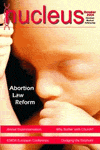Postmodernism
Editor,I appreciated Marcus Honeysett’s article ‘Christians in a postmodern world’ in April’s Nucleus (pp26-32). However I was uneasy at the way it came across as overwhelmingly negative about my culture.
A closer look at the relationship between the gospel and culture might help. Lesslie Newbigin points out that the gospel always comes to us ‘embodied in a culturally conditioned form of words…Every statement of the gospel in words is conditioned by the culture of which those words are a part...There can never be a culture free gospel. Yet the gospel…calls into question all cultures.’ (Foolishness to the Greeks. London: SPCK, 1986:4)
My culture is postmodernity and so my gospel is embodied in, and radically ‘calls into question’ postmodernity. But many evangelicals are operating within a gospel embodied in a modern mindset and so don’t take too kindly to postmodernity.
There are strengths and weaknesses in both modern and postmodern Christianity and it’s difficult to evaluate your own culture from within it. So there is enormous value in studying the Bible with believers of different cultures. They can see some of our blind spots, and we theirs. Cultures could be defined geographically but this might work as well with different generations within the same location.
Nobody nowadays would pitch up in an unreached foreign land and begin to proclaim the gospel with the preface, ‘Your culture is just wrong; you’d better adopt ours first, then you can be saved!’ If we understand this principle of cross cultural mission in a geographic sense why do we forget it with cross cultural mission in a chronological sense, albeit in the same physical locus?
Marcus’ article did have a modern taste, but from that position he was able to highlight some of the dangers of postmodernity for Christians living in that culture. Hence we should value his insights and warnings. Yet it would also be good for those Christians whose gospel is embodied in a more modern epistemology and worldview to listen to some of the postmoderns sometimes, and so maybe learn about some of the inherent weaknesses in their position.
James Ayrton,
Southampton University
Author’s reply
Editor,
I agree to a point about cultural conditioning, but the gospel is genuinely transcultural. Postmodern culture (as any other) is ultimately defined by its values, these being chiefly philosophical pluralism, relativism and the suspicion of metanarratives. Where these values conflict with Christianity then we can and must offer a real critique.
We should use gospel truth to critique culture - affirming the good and denying the bad - rather than letting our transient and often deeply anti-Christian culture critique the gospel (though it may critique our enculturated presentation of the gospel).
Marcus Honeysett































